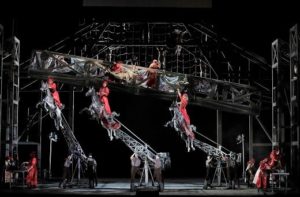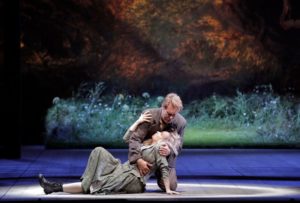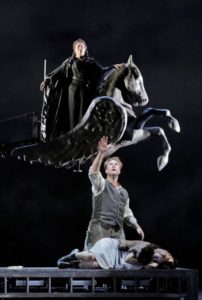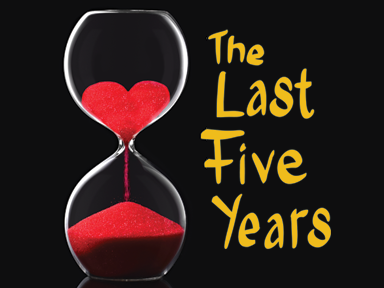
 Highly Recommended ***** The gods in Germanic mythology aren’t immune from fate. For an examination of what that means, look no further than Richard Wagner’s Die Walküre, the second part of his famous Ring Cycle, now being directed in a new production at the Lyric Opera by David Pountney. In the prologue, Das Rheingold, which played a year ago, the god Wotan (Eric Owens) briefly obtained a ring of power, which he was forced to pay a giant with for the construction of his palace. In the opening scene of Die Walküre, we see him laying an elaborate plan to get it back, but his plans soon come crashing down around him, bringing disaster to all the people he loves. With Sir Andrew Davis conducting and an all-star cast playing six characters plus eight other Valkyries, Die Walküre is a story focused on the internal conflict between what people owe themselves and verses what they owe the world, but it loses nothing for being set on a massive scale.
Highly Recommended ***** The gods in Germanic mythology aren’t immune from fate. For an examination of what that means, look no further than Richard Wagner’s Die Walküre, the second part of his famous Ring Cycle, now being directed in a new production at the Lyric Opera by David Pountney. In the prologue, Das Rheingold, which played a year ago, the god Wotan (Eric Owens) briefly obtained a ring of power, which he was forced to pay a giant with for the construction of his palace. In the opening scene of Die Walküre, we see him laying an elaborate plan to get it back, but his plans soon come crashing down around him, bringing disaster to all the people he loves. With Sir Andrew Davis conducting and an all-star cast playing six characters plus eight other Valkyries, Die Walküre is a story focused on the internal conflict between what people owe themselves and verses what they owe the world, but it loses nothing for being set on a massive scale.
Wotan finishes his opening stage magic by calling forth Siegmund (Brandon Jovanovich) to the house of Hunding (Ain Anger), deep within a remote forest. Hunding has forced a young woman, Sieglinde (Elizabet Strid), to become his wife; Siegmund is on the run from a family he angered by attempting to help another similarly-situated woman. Sieglinde hopes Siegmund will save her, too, and when Hunding declares his intent to duel Siegmund once the night ends and he is no longer bound by ancient customs of hospitality, Sieglinde points out a magic sword, crafted by Wotan, hidden in an ash tree. Siegmund is, in fact, Wotan’s son, and he and Sieglinde realize they are brother and sister. Wotan is pleased, thinking his plan to manipulate his mortal children into taking up the magic sword and using it to seize the ring is working. Then Siegmund and Sieglinde decide that being siblings is no obstacle to them getting married, breaking another ancient, cosmically-enforced custom, and forcing Wotan to turn against them. But when he complains to his Valkyrie daughter, Brünnhilde (Christine Goerke), she perceives there may be a way to save the situation, though it means defying Wotan’s edicts to accomplish his true desire.
Ingenious though Wagner’s weaving together of all the characters’ different motifs is to listen to, there’s really no substitute for seeing the drama unfold onstage. The singing actors not only possess booming voices and the charisma to hold the audience’s attention for very long stretches of time, they also display tenderness and camaraderie that gives human stakes to the mythological story. Yes, it’s disconcerting that Siegmund and Sieglinde become more attracted to each other after learning of their relationship, but their soaring duet as they find acceptance and love in each other after their trials is so joyful it’s impossible not to sympathize. Wotan and Siegmund never directly interact, but in a moment when Siegmund prays to his father for help finding the sword, we see the strength of the bond between them and know how devastating their rupture is.
Through Owens and Goerke’s skillful acting, the bond between Wotan and Brünnhilde is just as palpable. Wotan is saddled with a half-hour long exposition dump in Act II in which he summarizes the events of Das Rheingold. Owens makes this work by focusing on the fact that Wotan has never expressed these thoughts out loud before; as he tells Brünnhilde about how he’s gotten tangled in his own web, we see him fully realize just how much trouble he’s in (every course of action he can see results in him forfeiting power by breaking one of his oaths or the ring being used against him, the question is just whether he gets deposed now or in the near future). Part of Wotan’s plan is to raise an army by fomenting wars among mortals and using the Valkyries to collect their souls and bring them to Valhalla. Rather than being shocked at this, Brünnhilde is delighted at how well she has played her part, setting her up for a major change as she is dispatched to collect Siegmund’s soul and unexpectedly is inspired by his devotion to his wife.
Pountney’s directing conveys each of these character beats clearly. The set pieces he, late scenic designer Johan Engels, and scenic designer Robert Innes Hopkins came up with are sure to dazzle the audience but also fit each moment. Wotan’s flying palace is a fit perch from which to rule the heavens, but not to hide from the siege tower driven by his wife, Fricka (Tanja Ariane Baumgartner), who comes to demand he preserve their reign for now by acting against his mortal children. When those children declare that spring is coming into Hunding’s house to stir their passions, the stage briefly takes on its only moment of natural color. Marie-Jeanne Lecca’s ingenious costumes span the eras of our world but establish the psychological condition of their wearers. Most striking, and probably controversial, is Pountney’s setting for “The Flight of the Valkyries” at the start of Act III. After hearing Wotan describe his warmongering, we are suddenly confronted with the full horror of his actions and what Brünnhilde and the other Valkyries’ job really entails. I found that it worked. There’s no chorus in Die Walküre, although Pountney does use a troupe of male supernumeraries. We are mostly so caught up in the family drama and the isolation of Hunding’s house that it’s easy to forget there’s an entire world of people who are being affected by these events. “The Flight of the Valkyries” is also a piece of music that is easily misused, but Pountney has put it into a context where gore is totally repellent. Besides taking a moral stance, this choice gives more weight to Brünnhilde’s transformation and the Ring Cycle’s theme of the clash between love and power.
Of course, for all the thrills of the story and staging, the music can’t be neglected, and it is truly first-rate in a way that can only come from each of the artists’ passion for the work. Sir Andrew Davis keeps a massive orchestra (including four harps) energetic throughout the nearly five-hour run, making nearly every minute enjoyable. Strid and Anger are making their Lyric debuts and fit in naturally with the rest of the cast’s chemistry; Anger’s Hunding is as gaunt and menacing a figure as Siegmund and Sieglinde are vivacious. Sieglinde’s parting duet with Brünnhilde is an especially rousing moment in a night full of them, and Brünnhilde’s final duet with Wotan is a cathartic denouement. Goerke’s Brünnhilde is as lovable as she is intimidating, and every moment of the character’s growth is earned. While it is doubtlessly delightful to see the entire Ring Cycle, one need not have seen Das Rheingold to enjoy Die Walküre. The audience I attended with at the second performance was roundly pleased, albeit exhausted from having consumed such a massive story (“Even Act II was good!” one person marveled). The performers’ enthusiasm was evidently infectious.
Die Walküre will continue at the Civic Opera House, 20 N Upper Wacker Drive, Chicago, thru November 30, with the following showtimes:
November 14: 5:30 pm
November 18: 5:30 pm
November 26: 1:00 pm
November 30: 5:30 pm
Running time is 5 hours with two intermissions.
The Lyric offers parking deals with Poetry Garage at 201 W Madison St. if inquired about in advance. Tickets are $20-242; to order, visit LyricOpera.org or call 321-827-5600.
To see what others are saying, visit www.theatreinchicago.com, go to Review Round-Up and click at “Die Walkure.”







More Stories
“The Last Five Years” MILWAUKEE
“The Trial of Themistocles” reviewed by Julia W. Rath
“Titanique”